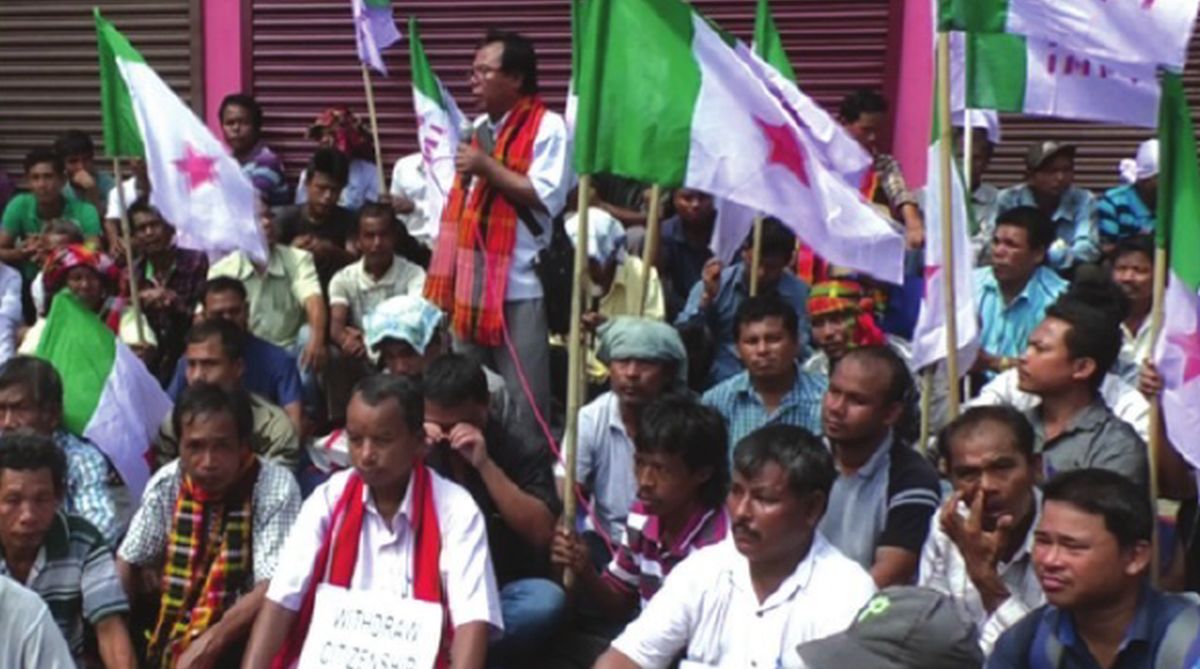After Assam, the demand for a National Register of Citizens is gaining momentum in Tripura. All the tribal parties, who otherwise are political adversaries to each other, are on the same page regarding the NRC.
The Indigenous Nationalist Party of Tripura, the oldest existing tribal party in the state, is trying to make it an important issue and even held a demonstration in Agartala on 25 August. There are reports that the party is looking to approach the Supreme Court for NRC implementation in the state.
Advertisement
The main rivals INPT, the Indigenous People’s Front of Tripura, the junior partner in the BJP-led government, is too in favour of the NRC. Other smaller tribal parties like IPFT (Tipraha), a splinter group of IPFT (NC), and the National Conference of Tripura have also joined the chorus.
It’s a fact that Tripura was a tribalmajority state but the continued influx of Hindu Bengalis from then East Pakistan, who faced discrimination and persecution there, especially during the 1971 Liberation War, altered the state’s demography. Even, people belonging to the tribal Chakma community, who are predominantly Buddhist, also left behind their homes in East Pakistan.
Bangladesh was formed with a secular constitution. However in 1991, secularism was compromised with the inclusion of the word “Islamic” in the constitution and since then it is an Islamic country, secular just in name. From then on there has been radicalisation in the society with reports of alleged persecution of minorities — Hindus, the largest minority group in Bangladesh, along with Buddhists and Christians.
The demand for NRC updation in Tripura is not wrong but the motives behind it are guided by a communal agenda. All the tribal parties are unanimous that the cut off year should be 1951, which seems an absurd demand. It would entail that most Hindu Bengalis — currently the largest linguistic group in the state — who came after 1951 would lose citizenship. That would cause absolute chaos. Tripura witnessed horrific riots between Bengalis and tribals in 1980 and memories of that period are still fresh among the non-tribal communities living in the state.
The NRC is for identification of illegal immigrants. In case of Hindu Bengalis, that label doesn’t stand as they are refugees. Refugees are people who left their country after facing discrimination and persecution, and moved to a safer place. Hindu Bengalis had crossed the border to save their own lives from the hands of Islamic radicals in East Pakistan, which, unfortunately, continued even after the formation of “secular” Bangladesh.
A statement from a member of the state’s royal family that indigenous people who came from East Pakistan should be exempted is an example of hypocrisy. One may well ask, if indigenous people can be exempted then why not Bengalis? The truth is both Hindu Bengalis and tribals — mostly Buddhists and some Hindus —crossed the border for the same reasons.
That said there have been reports of infiltration from Bangladesh. Although, most of the border is fenced, there are still infiltrations in some areas due to no fencing or weak fencing.
In this scenario, the NRC updation is welcome, going by the rationale in some quarters, but the cutoff date shouldn’t be 1951 nor should it be 24 March 1971. It was only after 24 March 1971 that the influx rose due to heavy persecution of Hindus in East Pakistan by the West Pakistan Army. So, if 24 March is taken as the cutoff date, will it not be an injustice to those who had to leave their homes due to statesponsored persecution?
In fact, a weakened INPT, searching for an issue to regain its base, is raising the issue of NRC only for vote bank politics. The party is trying to play with tribal sentiments and wants to disturb the communal harmony of the state. There is a 31 per cent reservation for the Scheduled Tribes in government jobs and 20 seats, one-third of the total number, are reserved for them in the state assembly. There is also a fully functioning tribal autonomous body — the Tripura Tribal Areas Autonomous District Council.
Truth is tribals have always had a say in government formation and government services. That said, in comparison to the Hindu Bengalis living in plain areas, the tribals living in the hill areas are lagging behind. The reason for this is the decades-long insurgency in those areas. That’s why, development reached the plain areas in a larger portion than the hill areas.
Unnecessary demands, which threaten the communal harmony of Tripura shouldn’t be encouraged. The NRC, if implemented, should be done carefully where there is a clear line of difference between illegal immigrants and refugees.
The writer is a freelance contributor based in Tripura.











